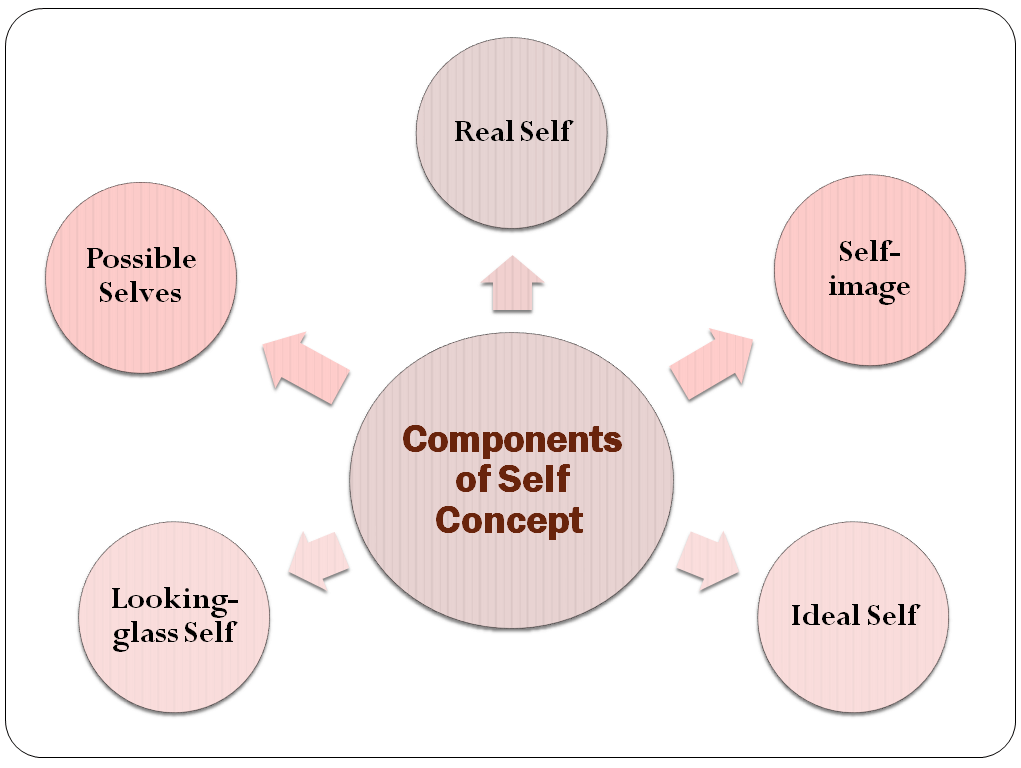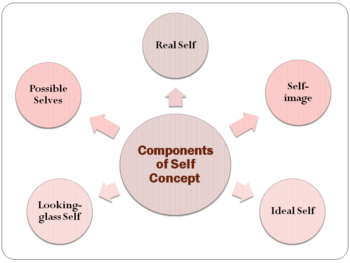Table of Contents:-
Self concept is the image we have of ourselves, it is about how we perceive our abilities, behaviours, and unique characteristics. For example, beliefs such as “I am a kind person” or “I am a humble person” are part of an overall self concept.
Self Concept Meaning
The thoughts, ideas and emotions held by persons about themselves are referred to as self-image or self concept. Self concept is significant to know the nature of consumer behaviour, as individuals are inclined to purchase those commodities which would help in enhancing their self concept. For example, a lady who considers herself a ‘beauty queen’ would prefer to buy trendy attire which would add to her fashionable image. Similarly, a man who believes himself a hi-tech guy would like to buy the trendiest digital machines.
The behaviour of everyone in this world is likely to be compatible with one’s self-image which is a detailed mental image about oneself. Those who consider themselves to be adventurous and energetic would probably refrain from buying a package cruise vacation if it is perceived as one meant for older people who relax in the lounge. Such people tend to go for exciting sports activities, like scuba-diving or skiing. However, in the recent past, the image of cruise vacations being meant for elderly people has got a makeover and it is attracting even adventurous and dynamic people. Therefore, it can be said that the idea of self concept (aka self-image) is employed by several marketers as a concept of one’s perception.
The self identity plays a significant role when choosing one’s recreational activities, like golf, river rafting paragliding, hunting, fishing, etc. Those people who enjoy boating can tell the difference between sailing on a boat with an engine or that with a sail. Those riding on the boats with engines consider being thrilling and full of fun as they think of it as a motor boat, while they consider sail boating as monotonous and simply a means to show off and impress.
Components of Self Concept
The following are the different components of the self concept:-
1) Real Self: Also known as the actual and objective self, it refers to the perception held by others about an individual. However, this definition is a bit inappropriate, as others are never familiar with the whole situation that may happen that the actual or real self of the person could be different from the one which is portrayed to the outside world.
2) Self-image: It refers to the way people perceive themselves. It is a subjective self where the real self could be different from the self-image, which could, however, be altered to some extent by getting feedback from those around us. People are likely to modify their self-image based on responses from others.
3) Ideal Self: Ideal self refers to the way individuals want themselves to be, which is related to the self-actualisation need, as identified by Maslow. Since people try to fill the difference between the ideal self and the self-image, this ideal self is mainly responsible for excessive spending among people.
4) Looking-glass Self: The looking-glass self refers to the way individuals think of being perceived by others. Though it is also called the social self but is not necessary that it matches with the way individuals are perceived by others as humans are incapable of reading minds. Even if people give us feedback, it is quite unlikely that they would acquaint us with the accurate picture, as they may try to be polite so that our self-image is not hurt. Hence, it is very difficult to know how individuals are perceived by others.
5) Possible Selves: Possible selves refer to the way individuals want themselves to become or the way they may become.

Types of Self Concept
Self concept is an important notion for all cultures. However, certain dimensions of self that have a significant impact on one’s consumption behaviour and other important attributes may differ across different cultural dimensions. Based on usefulness, experts have classified self concept into two broad groups, i.e., independent and interdependent, also referred to as one’s level or degree of separateness or connectedness.
They are discussed below:
1) Independent Self Concept
This is based on Western culture and believes that individuals are essentially different. It lays greater stress on individual goals, attributes, attainments and wishes. Persons with an independent self concept are characterised by attributes like individualism, egocentric attitude, self-supporting behaviour, and free and separate. They describe themselves their self and their achievements.
2) Interdependent Self Concept
The inherent basis of the interdependent self concept is rooted in Asian cultural beliefs and centres on the connectedness of human beings. This belief lays a lot of stress on family, cultural values, and professional as well as social relationships. Persons with this kind of self concept are generally obedient, attached, socio-centred, and relationship-oriented. Individuals of this group describe themselves through their social roles, relationships and common traits.
Independent and interdependent self concepts should not be understood as distinct categories. Instead, they should be understood as a bridge depicting extreme forms of cultural phenomenon along the opposite ends of a continuous line. Nevertheless, most cultures vary in nature. As such, within a particular cultural realm, sub-cultures and cultural groups, as well as individuals will vary along this personality continuum. For example, women in different cultures are relatively more of an interdependent self concept type as compared to men.
The variation with which individual cultures subscribe to the different personality dimensions can be seen in the way they interpret messages, demand, buy and consume luxury goods. For example, advertisements that primarily focus on individual actions and autonomous behaviour find much support from members of the independent self concept type. On the other hand, advertisements that focus on group actions find support from interdependent self concept individuals.
Applications of Self Concept
Following are the various applications of the self concept in the field of marketing:
1) Multiple-Selves and Branding
The idea of self concept can be used in the branding of products and different self concepts can be used to attract people of different personalities. For example. Philips used the concept of self in a very creative way while promoting its male grooming kits. It came up with the punch line “Who You Gonna Be Today” in its advertisement by showing the celebrity. John Abraham in different personalities and styles. In this way. Philips possibly attracted people with different personalities having different self concepts (but not to the level of opposing each other).
2) Brands, Actual Self, and Ideal Self
Though various self concepts can be employed by marketing people, it is very interesting to find how the philosophies of the ideal and actual self concept are used by marketers. The notion of the ideal self concept is used by marketers when they want the customers to recall how the features of the brand can help in attaining their perceived sales. For example, persons who consider them to be refined and trendy may choose the accessories of the Hermes brand. The same person may also opt for a car which would help him to show off among his peer group.
Similarly, Kellogg’s breakfast cereal is targeted at customers who want to lose weight. The brand is advertised by a slim and fit celebrity. The wheat grain range of Kellogg’s depicts a housewife who is tired after doing her household chores and rejuvenates herself after eating a bowl of this cereal. Another example could be the advertisement of the anti-wrinkle cream of Pond’s which shows that it is quite easy to restore youthfulness by using this cream.
These ads help in showing a transformation journey from the actual to the ideal self and also somewhat help in attaining the desirable social concept. The variation of the self concepts may not be essentially used as an aspirational approach. Urbanisation has changed the lifestyles of people, where family members hardly get any time to eat together. This trend is exploited by Cadbury, which used the jingle, “A family that eats together stays together”, along with its idea of “Meetha Dinner”. This type of approach would help in associating the ideal self concept for all those who desire it.
3) Reality to a State of Altered Reality
Marketers employ the idea of self concept in many ways to get closer to real situations.
For example, a fairness cream brand can come closer to reality when it is put forth with an aspirational appeal targeting middle-class women. Similarly, the Gitanjali diamond jewellery adds the punch line “Give in to your passion for jewellery”, which also brings it close to reality, appealing to the self concept of those who are looking to buy jewellery.
Another example could be the beauty care products brand, Kaya that used the caption, “Every beautiful woman you have envied now wants to be you” which is again closer to reality as it helps in fulfilling the desire for an ideal self concept. Yamaha’s fresh bike FZS used the caption, “This new year let your bike rule the streets” (Lord of the Street). The metaphor used here helps in associating the person to become the lord of the streets thus, depicting how the marketers could use the altered reality, considering the self-concept of the target group.
4) Brand Proposition for a Global Brand
The idea of self concept can be used to propose a global brand. For example, Snickers is offered in about fifty nations across the world as a hunger snack which could fulfil the basic human need. In the Indian context, the brand is promoting itself by targeting cricketers and stating a tagline. “You are not you when you are hungry”. It depicts the use of the malleable self which is adaptable to the various self conceptions of a person, viz., actual self, ideal self, bad self or “not me” self.
5) Perception and its Significance for Brands
The notion of self concept is used in perception and its relevance to different brands. For example, the advertising campaign of Dove Beauty Bar focuses on the significance of the actual self (how consumers perceive themselves) and social self (how the individual is perceived by others). As the significance of personal appearance is rising as a symbol of self-esteem, people are laying much importance on the idea of the social self concept (i.e., how individuals are perceived by others, instead of what the individuals are).
It has been depicted through Dove’s advertising campaign where an artist paints the image of the women based on their description of themselves (actual or ideal self concept) and it is compared with the image made by the perception of the others (social concept). It has been found that the images of women based on social concepts were much better than those made based on their self concept. So, it has been suggested by the campaign that the social self is more important than the self concept of the person (actual or ideal).
You may also like:
Impact of Globalisation on International Business
Importance of International Business Environment
Complexities of International Business
Multinational Companies Meaning and Definition
Modes of Entry into International Business
Impact of media on consumer Behaviour
Impact of social media on consumer behaviour
Factors Influencing Consumer Behaviour
Difference between consumer and customer
Psychoanalytic theory of perception
